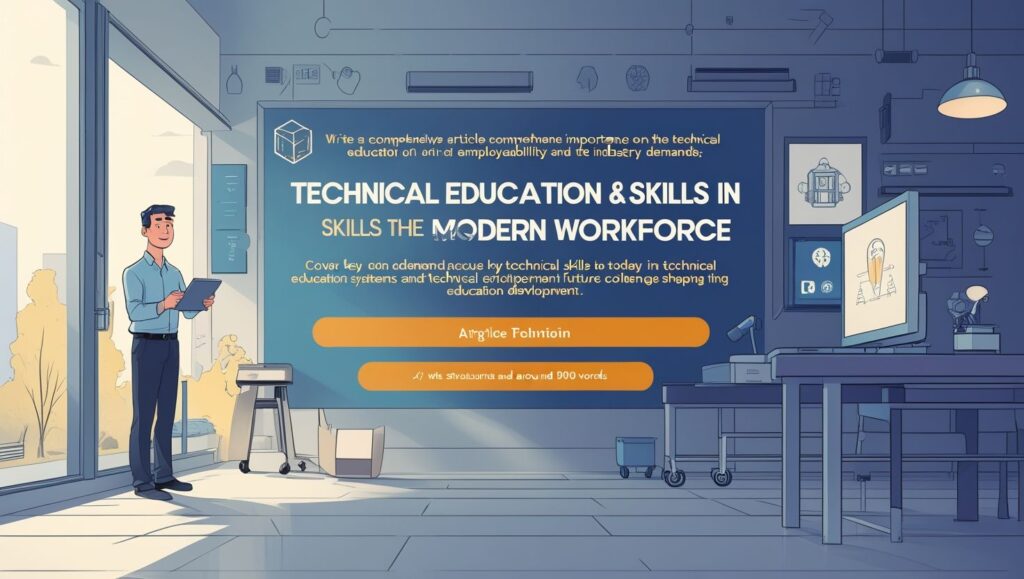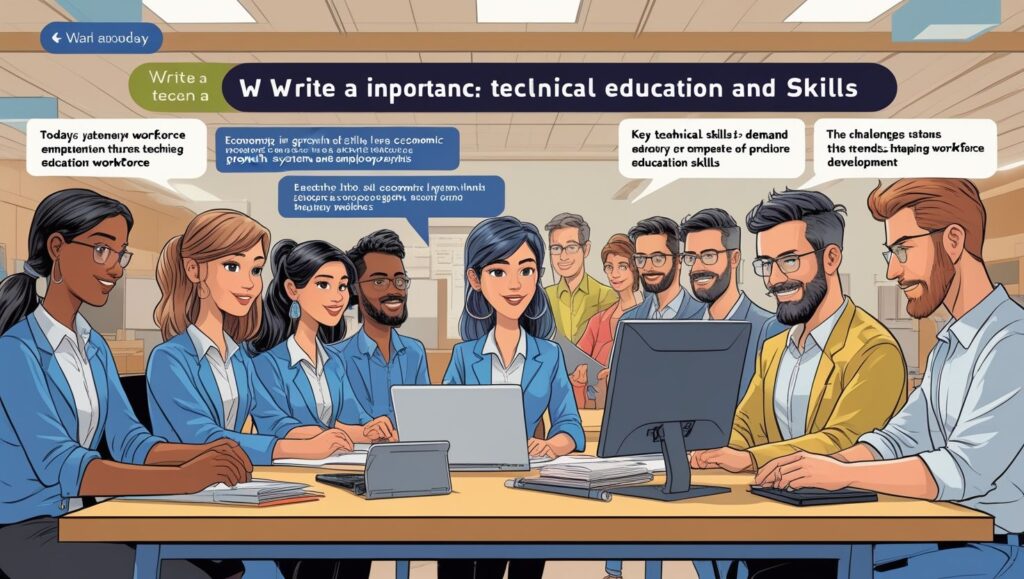Introduction
Technical Education and Skills, Technical education and skills development play a crucial role in shaping economies, industries, and individual career prospects. In an era of rapid technological advancements, the demand for skilled professionals in fields such as engineering, information technology, healthcare, and manufacturing has never been higher. Technical education bridges the gap between theoretical knowledge and practical application, ensuring that individuals are equipped with the competencies needed to thrive in the workforce.
This article explores the importance of technical education, its evolution over time, key skills required in today’s job market, challenges faced by technical education systems, and future trends that will shape workforce development.
The Importance of Technical Education
Technical education focuses on providing hands-on training and specialized knowledge in various vocational and professional fields. Unlike traditional academic education, which emphasizes theoretical learning, technical education prioritizes practical skills that are directly applicable in the workplace.
1. Meeting Industry Demands
Industries require a workforce with specialized skills to maintain productivity and innovation. Technical education ensures that students are trained in areas such as:
- Engineering and Manufacturing – CNC machining, welding, robotics
- Information Technology – Coding, cybersecurity, data analysis
- Healthcare – Nursing, medical lab technology, radiology
- Construction and Trades – Electrician work, plumbing, carpentry
By aligning curricula with industry needs, technical institutions help reduce skill gaps and unemployment.
2. Enhancing Employability
Graduates with technical skills often find employment faster than those with only general academic qualifications. Employers value candidates who can immediately contribute to operations without extensive additional training.
3. Supporting Economic Growth
A skilled workforce drives industrial growth, boosts productivity, and attracts foreign investment. Countries with strong technical education systems, such as Germany (with its dual education model) and South Korea (with its focus on STEM education), have seen significant economic benefits.
4. Promoting Entrepreneurship
Technical skills empower individuals to start their own businesses. For example, a person trained in automotive repair can open a garage, while someone skilled in software development can launch a tech startup.

Evolution of Technical Education
Technical education has evolved significantly over the centuries, adapting to industrial and technological changes.
1. Pre-Industrial Era
Before the Industrial Revolution, skills were passed down through apprenticeships. Craftsmen trained young workers in trades like blacksmithing, weaving, and carpentry.
2. Industrial Revolution (18th–19th Century)
The rise of factories created a demand for skilled labor. Vocational schools emerged, offering training in mechanics, engineering, and manufacturing.
3. 20th Century
- Post-World War II: Many countries expanded technical education to rebuild economies.
- Late 20th Century: The rise of computers and automation led to new technical fields like IT and electronics.
4. 21st Century (Digital Age)
Today, technical education includes advanced fields like:
- Artificial Intelligence (AI) and Machine Learning
- Renewable Energy Technologies
- Advanced Robotics and Automation
- Cybersecurity and Cloud Computing
Key Technical Skills in Demand Today
The job market continuously evolves, and certain technical skills are highly sought after:
1. Digital and IT Skills
- Programming (Python, Java, JavaScript)
- Data Science and Analytics
- Cybersecurity
- Cloud Computing (AWS, Azure)
2. Engineering and Manufacturing Skills
- 3D Printing and Additive Manufacturing
- Mechatronics and Robotics
- Sustainable Engineering Practices
3. Healthcare and Biotechnology
- Medical Imaging Technology
- Biomedical Equipment Handling
- Pharmaceutical Manufacturing
4. Green and Renewable Energy Skills
- Solar and Wind Energy Installation
- Energy Efficiency Management
- Electric Vehicle (EV) Maintenance
5. Soft Skills Complementing Technical Expertise
- Problem-Solving
- Teamwork and Collaboration
- Adaptability to New Technologies

Challenges in Technical Education
Despite its importance, technical education faces several challenges:
1. Outdated Curricula
Many institutions struggle to keep up with rapid technological changes, leaving students with obsolete skills.
2. Lack of Industry Collaboration
Without strong partnerships with businesses, training programs may not align with real-world job requirements.
3. Stigma Against Vocational Training
In some societies, technical education is seen as inferior to university degrees, discouraging students from pursuing skilled trades.
4. Insufficient Funding and Infrastructure
Many technical schools lack modern equipment, hindering hands-on learning.
5. Shortage of Qualified Instructors
Experienced professionals often prefer industry jobs over teaching, leading to a lack of skilled trainers.
Future Trends in Technical Education
The future of technical education will be shaped by emerging technologies and workforce demands:
1. Increased Focus on Digital Skills
As automation and AI grow, digital literacy will become essential across all industries.
2. Blended Learning Models
Online courses, virtual labs, and augmented reality (AR) will complement traditional hands-on training.
3. Micro-Credentials and Certification Programs
Short-term courses and industry-recognized certifications will allow professionals to upskill quickly.
4. Emphasis on Sustainability
Technical programs will integrate green technologies and circular economy principles.
5. Global Collaboration in Skill Development
Countries will work together to standardize technical qualifications, enabling global workforce mobility.
Conclusion
Technical education is a cornerstone of economic development, providing individuals with the skills needed to succeed in a competitive job market. As industries evolve, technical training must adapt to include emerging technologies such as AI, renewable energy, and advanced manufacturing. Addressing challenges like outdated curricula and societal stigma will be crucial in ensuring that technical education remains relevant and accessible.
Governments, educators, and industries must collaborate to create robust technical education systems that empower the workforce of tomorrow. By investing in skills development today, societies can build a future where innovation, productivity, and employment opportunities thrive.

14 thoughts on “Technical Education and Skills”
Comments are closed.